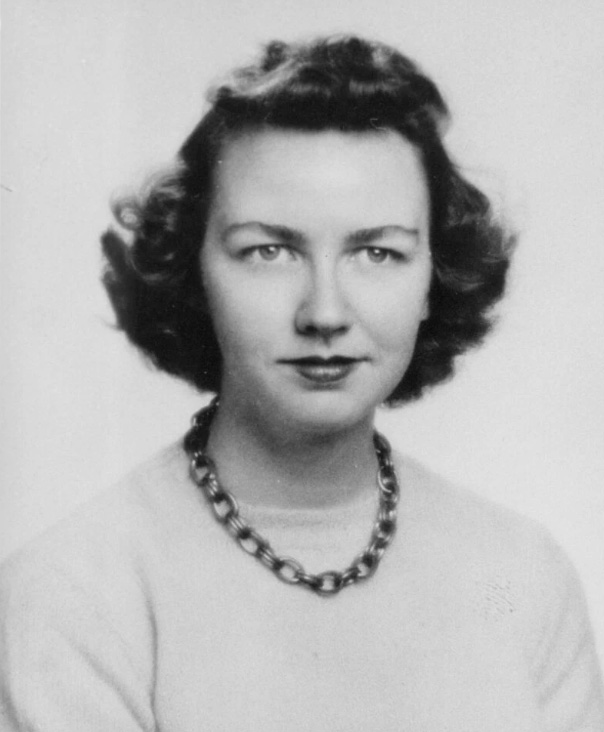[Adapted from my sermon at The District Church: “How to Pray.”]
Georgia, in the 1940s. A young woman sits down at her kitchen table, opens up a notebook, and begins to write. Her hand moves slowly, hesitantly, across the page; you can tell she’s thinking as she’s writing, that her thoughts are running far faster than her hand can keep up, that she’s correcting herself in her head even before the words make it to the page. Eventually, she lets out a soft sigh and puts down her pen; she stares at the last words she’s written:
Can’t anyone teach me how to pray?
 That young woman was the author Flannery O’Connor, and her question is one that, in some form or fashion, has been asked by millions of people in our time and for hundreds of years before us. It’s a question Jesus’ disciples directed to him as well—as we heard in our passage—and my hope and prayer is that this morning we’ll take a step toward answering that question.
That young woman was the author Flannery O’Connor, and her question is one that, in some form or fashion, has been asked by millions of people in our time and for hundreds of years before us. It’s a question Jesus’ disciples directed to him as well—as we heard in our passage—and my hope and prayer is that this morning we’ll take a step toward answering that question.
Jesus prayed. He prayed after he was baptized, and the Holy Spirit came upon him; when crowds came looking for him, they often found him in deserted places, praying; he spent nights on mountains praying; he prayed on his own and he prayed in the presence of his disciples. Prayer was important—indispensable, in fact—to Jesus. It was at the core of his being; it was the source of his connection with God and his power.
But what is prayer?
There are two parts to the way I want us to think about prayer: Dallas Willard puts it this way—“Prayer is simply [1] talking to God about [2] what we’re doing together.” Tim Keller breaks it down into “[1] conversation and [2] encounter with God.”
Prayer is (1) asking things of God for our lives and (2) aligning our lives in the ways God asks of us.
See, the goal of prayer—this is John Ortberg, and this is key—“is not to get good at prayer, not to see who can spend the longest time in prayer. … The goal is not to pray with greater feelings of certainty, or greater eloquence, or even greater frequency. The goal of prayer is to live all my life and to do all my ministry [or work] in the joyful awareness that God is present, right here, right now.” The goal is to see more of God’s kingdom come on earth, to see more of what God wants to happen happening, to see more of up there come down here.

The way I like to define “the kingdom of God” is God’s rule and reign in every life and every sphere of life. God’s rule refers to the new way of living that God brings about and makes possible in every person’s life, and God’s reign refers to the realm where God is in charge, where what God wants to happen actually happens, where God’s will is done. It’s personal, it’s social, and it’s systemic; God’s kingdom is about all-encompassing transformation—God-filled, Jesus-shaped, Spirit-empowered transformation.
God’s been laying on my heart recently the necessity of desperation in the spiritual life. You may be pretty competent, pretty capable; you may have gotten where you are because you’ve worked hard or applied yourself or leveraged your abilities. And you should be thankful for the things God has given us. But let’s never allow those things to fool us into thinking we don’t need God. Jesus said, in John 15:5:
Apart from me, you can do nothing.
I heard a story recently about a boy who was watching a holy man praying by a river. When the man finished praying, the boy wandered over to him and said, “Will you teach me how to pray?” The holy man looked him deep in the eyes, then took his head, plunged it under water and held it there. When he let him back up, the boy was indignant. “What did you do that for?” he sputtered. The holy man shook the water from his hands and said, “I’ve just taught you the first lesson of prayer. When you want to pray as badly as you wanted to breathe when your head was under water, only then will I be able to teach you.”
How desperate are you for the kingdom of God to come on earth as in heaven—the kingdom that Jesus said was so good and so desirable and so awesome that a person would sell everything he or she owned to have it?
Because here’s the thing: our ability to make space for God to move in the world and in our lives is directly proportional to our desperation for God. When I look back on the times in my life when I was most aware of God or felt most close to God or saw God’s power most tangibly, it was usually when I was broken, hurting, and helpless—after a break-up or when I had heart problems for no apparent reason or when my best friend from college was dying of cancer or when I realized I had absolutely no control over a particular person or situation in my life.
Desperation leads to honest prayer; desperation softens our hearts so that we can actually hear from God and be moved by God and be changed by God and be used by God.
And here’s the other thing: our desperation for God is directly proportional to our understanding of the reality of the condition of our lives and of our world—and to the complete inability we have to improve any of it apart from the power of God.
See, I think part of the challenge of praying for God’s kingdom to come is that we don’t know what that actually looks like—or maybe we haven’t taken the time to reflect on what that could look like. Because if we did, we’d be so captivated by what God wants to do and we’d be so cognizant of our absolute inability to make that happen, that our desperation quotient would be off the charts.
So let me start with this, from Revelation 21:1-4:
Then I saw “a new heaven and a new earth,” for the first heaven and the first earth had passed away, and there was no longer any sea. I saw the Holy City, the new Jerusalem, coming down out of heaven from God, prepared as a bride beautifully dressed for her husband. And I heard a loud voice from the throne saying, “Look! God’s dwelling place is now among the people, and he will dwell with them. They will be his people, and God himself will be with them and be their God. He will wipe every tear from their eyes. There will be no more death or mourning or crying or pain, for the old order of things has passed away.”
There will be no more school shootings; there will be no more gun violence in our neighborhoods or bombs dropped on our brothers and sisters around the world; there will be no more kids losing their lives before they had a chance to grow up; there will be no more death.
There will be no more refugees without homes; there will be no more xenophobia or racism or fear-based politics; there will be no more kids waiting for families; there will be no more mourning.
There will be no more bodies ravaged by cancer; there will be no more marriages falling apart; there will be no more broken homes; there will be no more crying.
There will be no more addiction; there will be no more poverty; there will be no more hunger; there will be no more pain.
For the old order of things has passed away. I want that reality here on earth as it is in heaven.
When we pray for God’s kingdom to come, we’re asking for justice to be found in our halls of government, for the poor and sick to be cared for, for the homeless to be housed, for our schools to be places where kids can grow and learn in safety, for marriages and families to be restored, and for every single person to have a place to call home.
When we pray for God’s kingdom to come, we’re also asking for our own souls to be transformed, so that the sin and selfishness in our own lives, the ways we lash out at others or hurt other people, our own addictions, our own destructive habits, our own distracted half-lives—might pass away and that we might increasingly take on the likeness and the shape and the character of Christ.
When we pray for God’s kingdom to come, we’re asking for our daily bread, trusting that God will provide not what we want but what we need.
When we pray for God’s kingdom to come, we’re asking for our sins to be forgiven just as we forgive those who sin against us, we’re asking for the things we owe to be forgiven just as we forgive what was owed to us, we’re asking for grudges to be dropped and for scores to no longer need to be settled.
When we pray for God’s kingdom to come, we’re praying that when we face times of trial or temptation—whether that’s losing a loved one or losing a job or not knowing how you’re going to break an addiction or not knowing where your next rent check is going to come from or whether you’re ever going to get married or whether your marriage is ever going to get better or whether you’ll ever be reconciled to your kids—we’re praying that we wouldn’t fall away, that we would remain faithful.
When we pray for God’s kingdom to come, we’re asking for God’s grace and love and beauty and goodness to be found in every life and every sphere of life.
That’s what I want to see more of, and I don’t know about you but I can’t do any of that on my own; I need God to do that in me and through me and around me.
And thanks be to God, that’s exactly what God wants to do in me by the power of his Spirit living in me. That’s exactly what God wants to do in us by the power of his Spirit living in us.
I want to pray so that I can see the reality of things as they really are.
I want to pray so that I can catch a glimpse of God’s vision and God’s heart.
I want to pray because I have caught a glimpse of God’s vision and God’s heart.
And I want to pray because I acknowledge in absolute desperation my absolute inability to make any of that come to pass without God.
—
If you’re interested, you can also check out my “Prayer” blog series from 2012:
Pingback:How to Trust God | JUSTIN FUNG